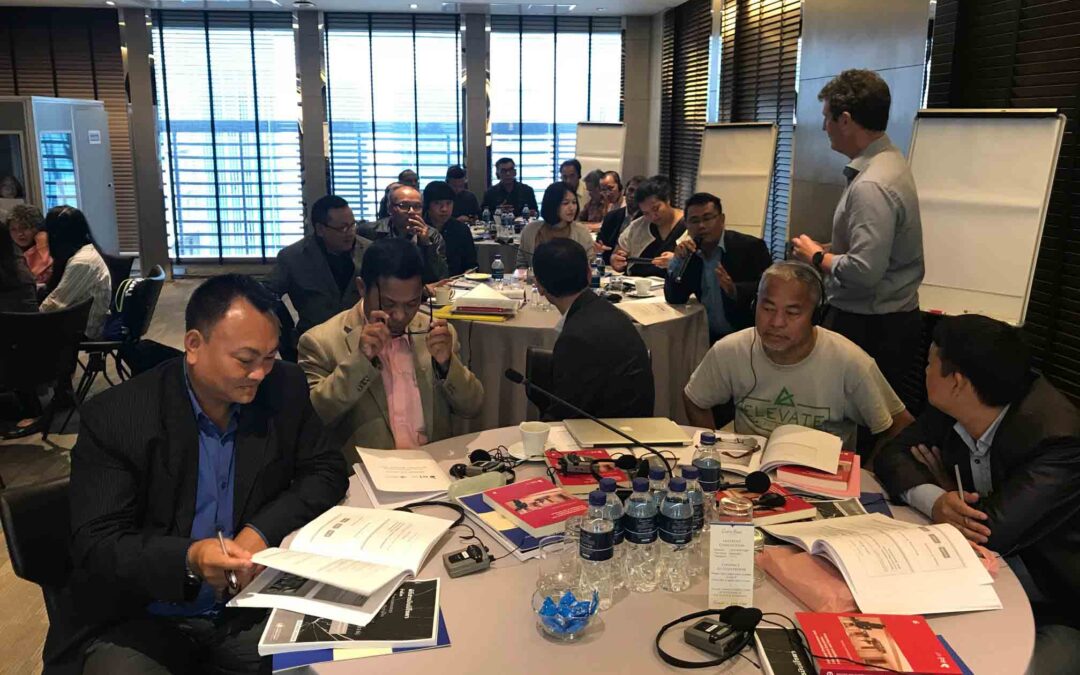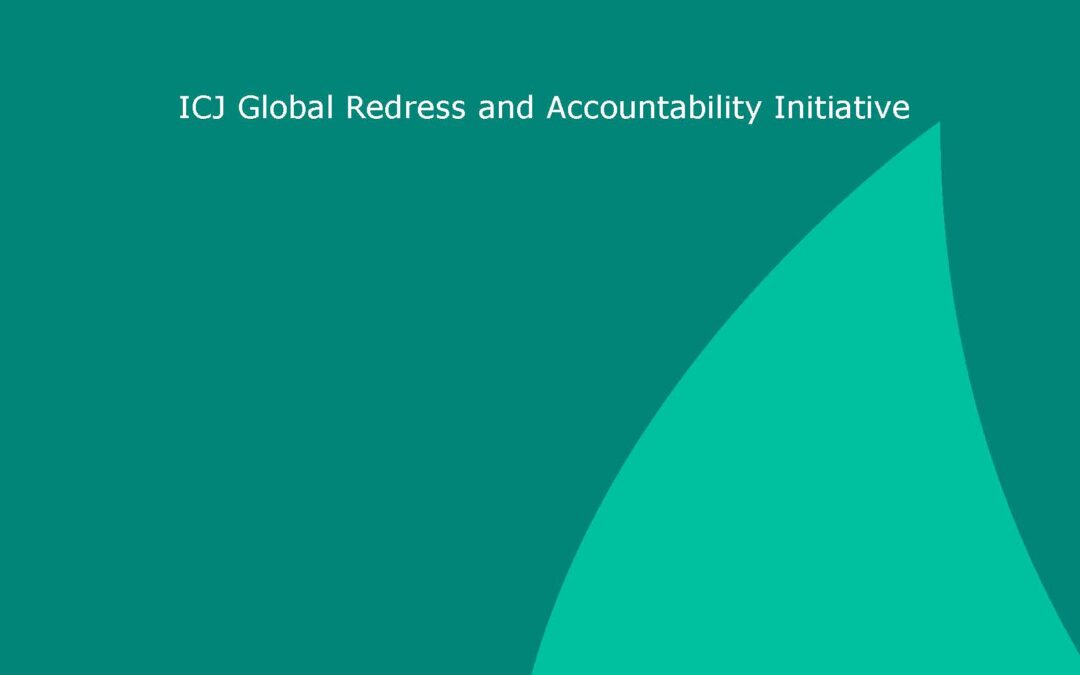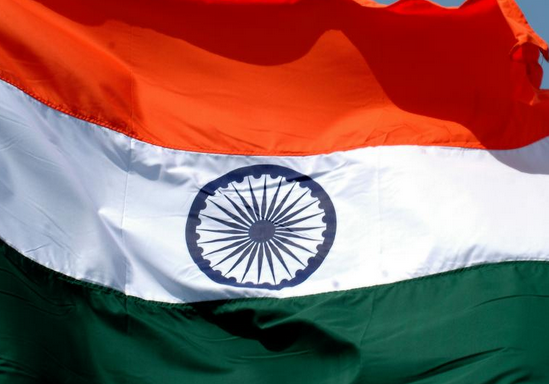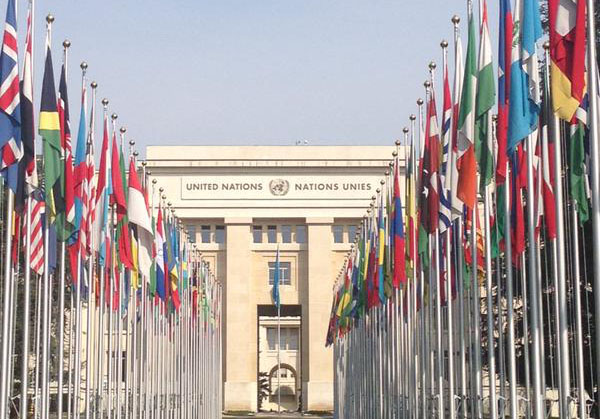
Dec 8, 2017 | News
From 5 to 8 December 2017, the ICJ co-hosted two workshops – the first one for lawyers with the UN Office of the High Commissioner for Human Rights (OHCHR) and the second one for authorities in Thailand – on the investigation of potentially unlawful deaths and enforced disappearance.
The first workshop’s attendees included 17 lawyers and academics from Thailand and eight lawyers from India.
Participants in the second workshop included 26 participants from Thailand’s Ministry of Justice, Department of Special Investigation (DSI), Royal Thai Police, Office of the Attorney-General, Ministry of Defence, Ministry of Interior, Southern Border Province Administration Centre and the National Human Rights Commission of Thailand.
The first event commenced with opening remarks by OHCHR Human Rights Officer and Thailand team coordinator, Imesh Pokharel, and Frederick Rawski, the ICJ’s Regional Director for Asia and the Pacific.
Aem-on Siang-Yai, Director of the Office of Rights and Freedoms Protection from the Rights and Liberties Protection Department of Thailand’s Ministry of Justice made additional opening remarks in the second event.
In both workshops, Kingsley Abbott, Senior International Legal Adviser for Southeast Asia at the ICJ provided an introduction to the revised Minnesota Protocol on the Investigation of Potentially Unlawful Death (2016), which was launched in Thailand on 25 May 2017; ICJ Practitioners Guide No 9 – Enforced Disappearance and Extrajudicial Execution: Investigation and Sanction (2015, in English, Spanish and Thai); and the international legal framework governing investigations into unlawful deaths, noting that Thailand has legal obligations including under its Constitution and the International Covenant on Civil and Political Rights (ICCPR), to which it is a State Party, to respect, protect and fulfil the right to life.
These obligations entail a duty to ensure investigations into potentially unlawful deaths are independent, impartial, effective, thorough and transparent.
Sean Buckley of OSACO Group, former New Zealand Police Detective and now an independent, international, investigative specialist with more than 20 years of investigations experience including more than seven years with the United Nations (including at the Special Tribunal for Lebanon and the United Nations High Commissioner for Refugees), provided in both events a technical training on a range of topics relevant to investigations using the revised Minnesota Protocol as a guide.
Kingsley Abbott was a member of the Forensics and Legal Working Groups which assisted with the revision of the Minnesota Protocol, while Sean Buckley was a member of the Advisory Panel.
The workshops focused on investigation techniques of potentially unlawful deaths, including controlling the crime scene, preserving the security of evidence and ensuring the safety of all parties involved in investigations, including witnesses, investigators and family members of victims.
The workshops also covered witness identification and interview techniques, collection of DNA evidence, drafting of investigation reports and crime file management.
Sean Buckley shared with participants different means of international assistance available for investigations of potentially unlawful deaths.
The Workshop also covered the collection and potential use of telecommunications evidence.
Sean Buckley and Imesh Pokharel presented on the interview and protection of witnesses.
Thailand and India are both state parties to the ICCPR.
Contact
Kingsley Abbott, ICJ Senior International Legal Adviser for Southeast Asia, kingsley.abbott(a)icj.org

Nov 1, 2017 | News, Publications, Reports, Thematic reports
The arrest of absconding murder convict Bal Krishna Dhungel, a senior Maoist leader, highlights the weaknesses, as well as the promises, for victims seeking accountability through Nepal’s judicial system, said the ICJ as it released a report on accountability mechanisms in the country.
The ICJ’s report Achieving Justice for Gross Human Rights Violations in Nepal concludes that impunity for gross human rights violations is one of the major obstacles to the creation of a stable and legitimate democratic government and lies at the heart of the rule of law crisis in Nepal.
It found that a lack of commitment by Nepal’s political leadership to address past and ongoing human rights violations continues to allow perpetrators to escape justice and undermines victims’ right to effective remedies and reparation.
“In the past, the promise to shield perpetrators for human rights violations has been used as a bargaining chip to garner political support and build political alliances,” said Frederick Rawski, Director of the ICJ’s Asia Pacific Regional Programme.
“It is imperative that accountability for human rights violations remains a priority for Nepal’s political leadership after Parliamentary elections, and that alliances between political parties are not once again used as an excuse to undermine Nepal’s human rights obligations,” added Rawski.
Attempts to thwart justice have also included the cynical manipulation of justice sector actors, from the police to the Attorney General’s office, in a way that threatens the independence and credibility of the institutions responsible for safeguarding human rights and the rule of law in Nepal, the report highlights.
This pattern of impunity persists despite demands for accountability by civil society and victims’ organizations, as well as the National Human Rights Commission and Nepal’s Supreme Court.
“In many ways, the Supreme Court of Nepal has emerged as a beacon of hope for victims of human rights violations,” said Rawski.
“The Court has given domestic effect to Nepal’s obligations under international law and has set high standards for accountability, remedy and reparations,” he added.
However, the Government’s disregard of key judgments has limited the impact of the Supreme Court’s jurisprudence, the report says.
Attacks on the independence of the judiciary, as demonstrated by the impeachment motion against former Chief Justice Sushila Karki, also indicate a worrying trend.
The ICJ’s report found that the mandate and operation of transitional justice mechanisms fall short of international standards despite the repeated reinforcement of such standards by the Supreme Court.
Though ostensibly formed to provide a measure of public accountability, the practice of forming ad hoc commissions of inquiry to investigate rights violations has promoted impunity by diverting investigations from the criminal justice process – where they belong – into parallel mechanisms that are established by means that make them vulnerable to political interference and manipulation.
The ICJ’s report also concludes that gross human rights violations in Nepal are not a thing of the past, but are ongoing.
Notably in the Terai region, the State has responded to the Madhesh movement with excessive use of force, extrajudicial killings, and torture and other ill-treatment.
Political expediency has trumped calls for justice and accountability and the Government continues to use State machinery to shield perpetrators rather than serve the interests of justice.
“In a seemingly perpetual cycle, the weak rule of law in the country contributes to impunity for human rights violations, and this culture of impunity further erodes the rule of law,” said Rawski.
“The search for truth and justice in Nepal will not be realized unless this cycle is ended,” he added.
Additional information
Dhungel had been absconding since the Supreme Court upheld his conviction for murder in 2010. The arrest comes after a contempt of court petition was filed before the Supreme Court against the Inspector General of Police for failing to implement multiple Supreme Court orders directing Dhungel’s arrest.
Contact
Frederick Rawski, ICJ Asia Pacific Regional Director, t: +66 64 478 1121, e: frederick.rawski@icj.org
Alex Conte, ICJ Global Redress and Accountability Initiative, t: +41.79.957.2733; e: alex.conte@icj.org
Download
Nepal-GRA Baseline Study-Publications-Reports-Thematic reports-2017-ENG (full report in PDF)
Read also
ICJ Discussion Paper Nepal’s Transitional Justice Process: Challenges and Future Strategy (August 2017)
ICJ Report Authority without Accountability: The struggle for justice in Nepal (October 2013)

Sep 11, 2017 | News
The Government of Myanmar must do everything in its power to respect and protect human rights during military operations in northern Rakhine State, said the ICJ today.
These military operations have reportedly resulted in widespread unlawful killing and the displacement of more than 200,000 people in response to attacks attributed to ARSA.
The ICJ called on Myanmar’s government to act as swiftly as possible to address the root causes of violence, discrimination and under-development in Rakhine, as well as for enhanced engagement by the international community in efforts to effectively address the situation, and to take measures to ensure that security operations are conducted in accordance with international human rights standards.
The military operations follow attacks by ARSA on August 25 on police posts and a military base in which at least 12 police, military and government officials were killed, along with a large number of attackers (according to government figures).
In the wake of the attacks on 25 August, the military launched what it has termed as a “clearance operation,” and the government announced that parts of northern Rakhine State have been designated as a “military operations area.”
“The attacks attributed to ARSA constitute serious crimes for which individual perpetrators should be brought to account through fair trials conducted in accordance with international standards,” said Sam Zarifi, ICJ’s Secretary General.
“But ‘clearance operations’ carried out by the Tatmadaw (Myanmar’s military) in an unlawful manner, and allegations of serious human rights violations, many amounting to crimes under international law, are on an entirely different scale and cannot be justified in the name of security or countering terrorism. These allegations must be promptly investigated in light of the Tatmadaw’s decades-long record of grave human rights violations and impunity throughout Myanmar,” he added.
“The Tatmadaw is responsible for the conduct of security operations in Rakhine as in other parts of the country, but the entire government remains responsible for upholding its international legal obligations to protect the rights of everyone living in Rakhine State – including the Rohingya Muslim communities that constitute the overwhelming majority of the population in the areas most affected by the violence,” Zarifi said.
“We also urge the State Counsellor Aung San Suu Kyi to use her immense electoral popularity and moral stature to push for full respect for human rights for the Rohingya as well as all others in Rakhine State.”
In the wake of the attacks on 25 August, the military launched what it has termed as a “clearance operation,” and the government announced that parts of northern Rakhine State have been designated as a “military operations area.”
These terms are not clearly prescribed in Myanmar’s laws, but in practice seem to be used to grant the military authority to ignore legal protections afforded under the country’s constitution and international standards.
“Whatever descriptive cover may be used to describe security operations, they must scrupulously respect international standards on the use of force.” Zarifi said.
“Myanmar’s government has the right, indeed the obligation, to protect all people in its jurisdiction from attacks by armed groups, but it must do so in conformity with international law. Experience from around the world has shown that greater respect for rule of law and human rights is the most effective response to terrorism,” he added.
This was unfortunately not the case following the arrests and detentions carried out during the military operations that followed attacks in October 2016.
Many of these arrests appear arbitrary and unlawful, as detainees were not given access to legal counsel, and deaths in custody have not been properly investigated.
Similar violations by the military have been documented recently in Shan and Kachin States.
Government authorities must ensure that arrest and detention in the context of the current operations in Rakhine State be conducted in accordance with national and international law, and respect the rights to liberty, freedom from arbitrary detention and a fair trial.
The most effective way for the government to respond to allegations of abuse by the security forces both in Rakhine and elsewhere in the country would be to take well-founded allegations seriously, and ensure that they are promptly, impartially and thoroughly investigated and those responsibility are brought to justice.
It is an unfortunate fact that investigations and prosecutions of human rights violations are rarely undertaken in regular courts, as national laws shield security forces from public criminal prosecutions, often by using military or special police courts.
Zarifi further said: “Ending the military’s impunity would establish much needed confidence in the government’s commitment to upholding the rule of law.”
“One immediate way to illustrate this commitment would be to cooperate with the UN Fact Finding Mission, which the ICJ and other organizations called for earlier in the year, to investigate allegations of human rights violations and abuses in Myanmar.”
“There are paths forward for the government to both respond to allegations of rights violations, and to show its commitment to finding solutions to the unacceptable state of affairs in Rakhine State.”
Myanmar-RakhineStateCrisis-PressReleases-2017-ENG (full press release)

Jul 30, 2017 | News
Indian authorities must ensure full compliance with the Supreme Court’s historic judgment directing independent investigations into alleged extrajudicial killings by the police and security forces in Manipur from 1979 to 2012, the ICJ said today.
The ICJ is calling for independent, impartial and thorough investigations into all cases, in line with international standards.
It is further calling on Indian authorities to ensure all accused are brought to justice in fair trials in ordinary civilian courts, and that the families of victims are accorded access to an effective remedy and reparation for any human rights violations.
“Through this judgment, the Indian Supreme Court has given fresh hopes to the victims of human rights violations in India who seek justice,” said Frederick Rawski, ICJ’s Asia Pacific Programme Director.
“This bold and principled decision should finally end the cynical attempts by Indian security forces and law enforcement agencies to shield themselves from criminal accountability,” he added.
On 14 July 2017, the Supreme Court ordered the Director of the Central Bureau of Investigations (CBI) to constitute a Special Investigation Team (SIT) within two weeks to go through the records of at least 85 cases of alleged extrajudicial killings that took place in Manipur between 1979 and 2012, lodge First Information Reports (FIRs), and complete investigations where required.
The Court also directed that the investigations must be completed by 31 December 2017.
The Court noted that the Manipur Police had not registered any FIR at the instance of the family members of the deceased.
It also held that the Manipur Police could not be expected to carry out impartial investigations as some of its own personnel were said to be involved in the “fake encounters”.
India has a legal obligation under Articles 2(3) and 6 of the International Covenant on Civil and Political Rights (ICCPR), to which it is party, to investigate allegations of violations of the right to life promptly, thoroughly and effectively through independent and impartial bodies and to ensure that those responsible are brought to justice.
On 27 July 2017, the CBI constituted a five-member Special Investigating Team in accordance with the Supreme Court’s directions.
“The CBI’s compliance with the Supreme Court’s directions through the prompt constitution of an investigation team is a welcome step,” added Rawski. “It must now ensure that investigations are thorough, independent, impartial and in line with international standards, including the ICCPR.”
The ICJ urged the State of Manipur and the Union of India to extend full cooperation and assistance to the Special Investigating Team to complete the investigations without any hurdles or delays.
Other allegations of human rights violations in the petition must also be investigated in line with international standards, the ICJ said.
Contact
Frederick Rawski, ICJ’s Asia Pacific Regional Director (Bangkok), e: frederick.rawski(a)icj.org
Background
Extrajudicial Execution Victim Families Association, Manipur (EEVFAM) and Human Rights Alert filed a petition in the Supreme Court of India in 2012, alleging that from 1979 to 2012 over 1,528 cases of fake “encounter killings” had taken place in Manipur.
They further alleged that the State government had not conducted proper investigations into the allegations of excessive use of force by the security forces and the police and requested the Court to constitute a special investigation team, comprising police officers from outside the state of Manipur, to conduct a probe into the alleged unlawful killings.
In July 2016, the Supreme Court emphasized the need for accountability for human rights violations by security forces, including under the Armed Forces Special Powers Act (AFSPA), and directed the petitioners to present detailed documentation in support of their allegations.
In April 2017, the Supreme Court dismissed the Central Government’s curative petition requesting the Court to reconsider its July 2016 judgment on the ground that it hampered the security force’s ability to respond to insurgent and terrorist situations.
The killings mentioned in the petition all took place in areas considered “disturbed” under AFSPA. Once an area is declared “disturbed”, armed forces are given a range of “special powers”, which include the power to arrest without warrant, to enter and search any premises, and in certain circumstances, use lethal force.
AFSPA has facilitated gross human rights violations by the armed forces in the areas in which it is operational.
Human rights organizations, including the ICJ, and several UN human rights bodies have recommended that the AFSPA be repealed or significantly amended.

Jul 27, 2017 | News
Pakistani authorities must implement the United Nations Human Rights Committee recommendations to ensure compliance with Pakistan’s human rights obligations under the International Covenant on Civil and Political Rights (ICCPR), the ICJ said today.
The Human Rights Committee, the treaty-monitoring body that oversees countries’ implementation of and compliance with the ICCPR, reviewed for the first time Pakistan’s human rights record under the Covenant on 11 and 12 July.
It issued its “Concluding Observations”, along with its recommendations, today, on 27 July.
“While it is encouraging to see Pakistan’s increased engagement with United Nations human rights mechanisms in recent years, it is deeply worrying that since ratifying the ICCPR, Pakistan’s human rights situation has worsened in a number of aspects, including with the restoration of the death penalty and the introduction of military trials for civilians,” said Livio Zilli, ICJ’s Senior Legal Adviser and UN Representative.
“It is of the utmost importance for Pakistan to reverse this trend, and make sincere efforts to implement the recommendations made by the Committee,” added Zilli.
The Committee’s recommendations include:
- Ensure the National Commission for Human Rights is able to carry out its mandate independently and effectively;
- Reinstate the moratorium on the death penalty;
- Abolish mandatory death penalty and ensure the death penalty is provided only for the “most serious crimes” involving intentional killing;
- Criminalize enforced disappearance and put an end to the practice of enforced disappearance and secret detention;
- Ensure that all allegations of enforced disappearance and extrajudicial killings are promptly and thoroughly investigated; all perpetrators are prosecuted and punished with penalties commensurate with the gravity of crimes;
- Review legislation relating to the military courts with a view to abrogating their jurisdiction over civilians as well as their authority to impose the death penalty;
- Reform the proceedings of military courts and bring them into full conformity with Articles 14 and 15 of the Covenant to ensure a fair trial;
- Ensure that all elements of the crime of torture are prohibited in accordance with article 7 of the Covenant;
- Repeal all blasphemy laws or amend them in compliance with the strict requirements of the Covenant; and
- Review policies and legislation on registration of international NGOs, including the vague grounds on which registrations can be cancelled.
This is the first time Pakistan’s human rights record is being reviewed by the Human Rights Committee since Pakistan ratified the Covenant in 2010.
Contact:
Livio Zilli, ICJ Senior Legal Advisor and UN Representative (Geneva), e: livio.zilli(a)icj.org
Reema Omer, ICJ International Legal Adviser for Pakistan (Lahore), t: +923214968434; e: reema.omer(a)icj.org
Background:
Pakistan ratified the International Covenant on Civil and Political Rights (ICCPR) in June 2010.
Following ratification/accession, every state party to the ICCPR is required to submit an initial “state report” containing information on the implementation of each provision of the treaty.
Pakistan submitted its initial state report to the Human Rights Committee in October 2015.
In light of the information provided in the State report, as well as information received from civil society, the Human Rights Committee then prepared a List of Issues containing particular issues of concern to the Committee, and asking whatever questions it sees fit in light of those concerns.
The answers provided by the State party to these questions, as well as other information submitted by civil society and others formed the basis of the “review” of the State’s compliance with the treaty, which was carried out on 11 and 12 July by the Human Rights Committee.
During the review, the Committee met with Pakistan’s delegation, headed by Federal Minister for Human Rights, Senator Kamran Michael, who presented answers to the List of Issues and responded to the Committee’s questions.
The Committee’s Concluding Observations issued today are highly authoritative, and highlight the Committee’s concerns and make recommendations to the State on improving the implementation of the ICCPR.
The ICJ made submissions to the Human Rights Committee in relation to the formulation of List of Issues in 2016 and the Review in 2017.
In its submissions, the ICJ raised concern about the inadequate legal framework on torture and other ill-treatment; the continuing practice and impunity for enforced disappearances; the incompatibility of military trials of civilians with the right to a fair trial; the incompatibility of Pakistan’s blasphemy laws with the rights to freedom of religion and belief, expression and fair trial; and the vaguely defined INGO policy.
The Human Rights Committee picked up ICJ’s concerns as its principle matters of concern and recommendations in its Concluding Observations.









